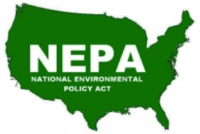A federal district court judge in Lake Charles, La. has barred the Biden administration from using a hefty increase in the value of the “social cost” of carbon emissions when taking actions such as granting facility permits and setting new regulations. Agencies are still required to consider the climate impacts of their regulations, however.
Ten states challenged President Joe Biden’s January 2021 executive order directing federal agencies to capture the full costs of greenhouse gas emissions as accurately as possible, including global damage. The order reversed the Trump administration decision to cut the social cost of carbon to $7 or less per metric ton—temporarily restoring the cost figure to the Obama-era level of $51 per metric ton while it prepared to release a new cost figure, expected in coming weeks.
Federal Judge James Cain agreed with the states that the higher cost would harm their ability to purchase affordable energy and simultaneously decrease their revenue from fossil energy lease sales. “Specifically, Louisiana will be directly harmed by the reduction of funds necessary to maintain the state’s coastal lands,” Cain, a Trump appointee, said in his 44-page decision.
The temporary ban only considers the requirement of federal agencies to consider global effects of greenhouse gases, the judge said, while also noting that Biden’s order did not comply with the federal Administrative Procedures Act.
Jim Krane and Mark Finley, energy fellows at Rice University, noted other ways to account for the costs of climate change. “A carbon tax is more straightforward and effective, but tougher to enact because it requires Congress to act,” they said in an opinion for the Conversation, a non-profit group. The tax would dissuade people from burning fossil fuels.
A marketplace for companies to trade emissions, cap-and-trade programs, are another form of carbon pricing, Krane and Finley said.
Louisiana Attorney General Jeff Landry claimed victory. “While our fight is far from over, I am pleased the court granted preliminary relief against the President’s unacceptable and unauthorized executive overreach,” he said in a statement.
Other states joining the complaint were Alabama, Florida, Georgia, Kentucky, Mississippi, South Dakota, Texas, West Virginia and Wyoming.
A Missouri federal court last year struck down a similar suit by conservative states, ruling they did not have standing to sue.
The administration had not issued a statement on the ruling or on its intent to appeal by ENR posting time.





